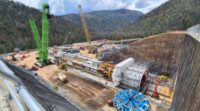Panama Canal construction consortium Grupo Unidos por el Canal (GUPC) has confirmed the filing, made late last month, of more than $737 million in new claims to owner Panama Canal Authority (ACP) just as the contractor touts a favorable ruling Dec. 31 by the $5.25-billion project's disputes board related to two previous claims. GUPC may still challenge the panel decision, which awarded it only $234 million of about $463 million it had sought.
GUPC, led by contractors Sacyr and Impregilo, and ACP have until Jan. 27 to appeal the ruling to a Miami international tribunal. At ENR press time on Jan. 13, neither confirmed an appeal to ENR, but ACP Executive Vice President Ilya Marotta told a Latin American publication on Jan. 8 that it would issue "a note of dissatisfaction" with the ruling. She also disagreed with the assessment that ACP's actions had been "negligent."
The project's Panama-based Dispute Adjudication Board agreed with GUPC on one claim that, at the start of the project in 2009, basalt supplied by ACP for concrete production was of poor quality and that it should be compensated for added costs. DAB also affirmed GUPC's claim that ACP's slowness in approving its concrete mix caused up to a nine-month delay. The claims were submitted three years ago, but GUPC says ACP declined to discuss them. "This is a big morale boost for all who are working very hard to push forward this project in very difficult conditions," said a GUPC official to ENR.
The latest GUPC claims involve one for $333 million that is related to a dispute with ACP over the weight of canal gates for the locks expansion. The second claim, for $404 million, is due to delays in the fourth phase of excavation on the Pacific Ocean side. Canal administrator Jorge Quijano told local media that ACP is evaluating the new claims for merit but said the issues raised will be difficult for the contractor to justify. The latest filings bring the total of project claims to nearly $2.3 billion.
ACP, GUPC and a project surety agreed to a new funding approach last February, after cost disputes prompted a two-month work stoppage. The project is set for completion in the first quarter of 2016.






Post a comment to this article
Report Abusive Comment